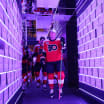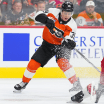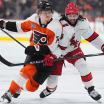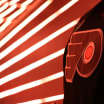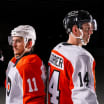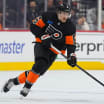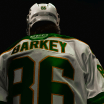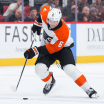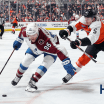There has as always been a grudging respect between the Philadelphia Flyers and Boston Bruins, to go along with ebbs and flows of a heated rivalry. The teams have met in the playoffs a half-dozen times over the years, including a Stanley Cup Final class in 1974, Stanley Cup semifinal meetings in 1976, 1977 and 1978 and Eastern Conference semifinal series in 2010 and 2011. They also played each other in a Winter Classic (Fenway Park 2010). Both teams have left each other with their share of heartbreaks and bruises along the way.
One thing that's new this season: the Flyers and Bruins were never in the same division with each other during the regular season before the divisional realignment for this season. That did not mean, however, there wasn't plenty of animosity when the teams faced off.
Until last season, the Flyers had little recent success against the Bruins. Finally, in 2019-20, the Flyers prevailed in three of four regular season meetings with the Bruins -- two Philly wins coming via shootout and one in overtime -- and then sent Boston down to 4-1 defeat during the Round Robin phase of the 2020 Stanley Cup playoffs.
The following is a look at what's happened with the Bruins during the 2020 offseason, analysis on how the Eastern Division matches up on paper with Boston and a look at the schedule for the eight-game season series with the Flyers. There's also a brief history of the rivalry between the teams.
Rival in Focus: Boston Bruins
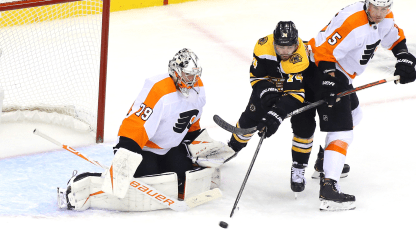
STILL A POWERHOUSE BUT AGING
Last season, head coach Bruce Cassidy's team was the only NHL team to reach 100 points in the pandemic-shortened regular season. The Bruins finished eight points ahead of the eventual Stanley Cup champion Tampa Bay Lightning. Unfortunately for Boston, the team struggled in the playoffs to pick up where it left off in the regular season. The Bruins dispatched the Carolina Hurricanes in five games in the first round but then lost in five to Tampa in the Eastern Conference semis.
The Bruins sustained some significant roster departures during the 2020 offseason, especially on the blueline. Offensive defenseman Torey Krug left as an unrestricted free agent to sign with the St. Louis Blues. Team captain and franchise icon Zdeno Chara, at age 43, recently signed a one-year contract with the Washington Capitals after 14 years with the Bruins.
During the offseason, the Bruins were able to re-sign defenseman Kevan Miller to a one-year extension after he missed the entire 2019-20 season due to injury. Young star defenseman Charlie McAvoy is the Bruins' top blueliner, but will need a new partner following Chara's departure. Brandon Carlo is also a fine young established NHLer at age 24. Matt Grzelcyk (who has a new four-year contract) and John Moore are still on hand with the Bruins. Meanwhile, the departures of Chara and Krug could mean more playing opportunities for the likes of Connor Clifton, Jeremy Lauzon, Jakub Zboril or Urho Vaakanainen.
Up front, the Bruins remain deep and formidable, but there some worries about injuries and advancing age among some in the core group. David Pastrnak has emerged as one of the top scorers in the entire NHL and is still just 24 year old. However, he had offseason hip surgery and is likely to miss the start of the season. "Pasta" is currently on a week-to-week basis.
Super-pest Brad Marchand has a more favorable short-term prognosis after offseason sports hernia surgery. He has been skating for weeks and is expected to be able to practice throughout camp and be ready for the start of the season. On the flip side, hernia surgery can be a tricky one to quickly come back from at full strength, and Marchand is now 32 years old.
Patrice Bergeron remains a perennial Selke Trophy candidate and one of the top faceoff men in the league. Coming off three straight 30-goal seasons, it's not as if the 34-year-old seems to be slowing down yet, but the Bruins' Stanley Cup window is getting narrow while Bergeron is still able to be a top player. Ditto the now 33-year-old David Krejci; a highly effective and serially underrated player for the Bruins for well over a decade.
Boston's attack goes beyond just its big line, and there are many sound all-around players in the lineup. Boston still has the 28-year-old Charlie Coyle to center its third line, and the club got Jake DeBrusk signed to a two-year extension. Formerly with the Nashville Predators, 31-year-old Craig Smith is a new addition to the Bruins this season after signing a three-year deal. The club also added well-traveled forward Greg McKegg as a free agent depth signing after he played for the Rangers last year.
In goal, the Bruins will once again turn to the veteran duo of 33-year-old Tuukka Rask and 35-year-old Jaroslav Halak. Rask had a sensational regular season in 2019-20 before ultimately opting out of the Bubble after four games for family reasons.
All in all, the Bruins remain a significant threat to win the Eastern Division and/or make a deep run in the playoffs. But the time is getting short with a significant part of the nucleus aging, and some reconfiguration to do on the blueline.
2020-21 FLYERS VS. BRUINS SEASON SERIES
Jan. 21 Flyers @ Boston Bruins
Jan. 23 Flyers @ Boston Bruins
Feb, 3 Boston Bruins @ Flyers
Feb. 5 Boston Bruins @ Flyers
Feb. 21 Flyers @ Boston Bruins
Mar. 7 Flyers @ Boston Bruins
Apr 5 Boston Bruins @ Flyers
Apr 6 Boston Bruins @ Flyers
FLYERS VS. BRUINS: RIVALRY HISTORY
Over the course of the last half century, the Philadelphia Flyers and Boston Bruins have built a strong rivalry. Both franchises prided themselves on their toughness and grit, and some of their respective most iconic victories and most crushing defeats have come at each other's hands
.
Entering the 2020-21 season, the Flyers hold an all-time record of 73-97-10 record with 21 ties against the Bruins. The teams have also met six times in the playoffs, with the Flyers winning three series (1974, 1976 and 2010) and the Bruins winning three (1977, 1978 and 2011).
In 1974, the "Broad Street Bullies" upset the "Big Bad Bruins" in the Stanley Cup Final, four games to two. The Flyers won again in the 1976 Stanley Cup Semifinals, four games to one. In the 1977 Cup Semifinals, the Bruins grabbed overtime wins in Games 1 and 2 on the way to a
four-game sweep. Boston prevailed in five games in the 1978 Cup Semis.
After playing each other in the playoffs four times in five years, the teams did not meet again in the postseason until the 2010 Eastern Conference Semifinals. That year, the Flyers carved out a place in NHL history by coming back from a three games to zero deficit and then trailed 3-0 in the first period of Game 7 before storming back to win the series. The next year, the Bruins gained a measure of revenge by sweeping the Flyers in four games in the Eastern Conference Semis.
Beneath the surface of the animosity of the Flyers-Bruins rivalry, there is a lot of hard-earned respect. Additionally, there is also a lot of shared history.
Expansion Draft: Flyers claim 7 Boston players
By the time the NHL Expansion Draft rolled around on June 6, 1967, the Flyers were thoroughly prepared through the exhaustive scouting that had been done and with an unwavering selection strategy in place to select goaltenders first and, in general, to prefer younger players over aging veterans.
After the Los Angeles Kings selected 37-year-old future Hockey Hall of Fame goaltender Terry Sawchuk with the first overall pick of the draft, it was the Flyers' turn. The team chose 22-year-old Boston Bruins goaltender Bernie Parent; himself a future Hall of Famer but still early in his career rather than nearing the end.
In the second round, the Flyers used the ninth overall pick to select another Bruins goaltending prospect: 22-year-old Doug Favell, who had also been teammates with Parent on the Ontario Hockey Association's Niagara Falls Flyers (owned by the Bruins).
Equally prophetic was the Draft-floor strategy that the Flyers' decision-makers executed of picking heavily from players left unprotected by the Bruins. Among the 20 picks the Flyers made at the Expansion Draft, seven were made from Boston.
With the hindsight of a half century, this fact may not seem remarkable. For its time, though, it was quite bold and indicative of the digging-beneath-the-surface scouting work that had been done by general manager Bud Poile, coach Keith Allen and scout Marcel Pelletier.
Here's why: The Bruins had been a perennial last-place team in the NHL in that era. Boston had brought up the rear of the Original Six for the better part of the last decade, were eight years removed from their last playoff appearance (at a time when four of the six teams got in, and the
bottom two missed) and were coming off a 17-43-10 season in 1966-67; 14 points below the fifth-place Red Wings.
However, when the Flyers scouted the Bruins organization, they saw what few others saw outside Beantown: an organization brimming with young talent - even to the point of surplus - that was about to blossom into an NHL powerhouse. Before long, the "Big Bad Bruins" were the
NHL's most fearsome team.
After selecting Parent and Favell in the first two rounds, the Flyers'; subsequent picks from among unprotected Boston players included Jpe Watson in the fourth round (21st overall), defenseman Dick Cherry - the younger brother of Don Cherry - in the 11th round (63rd overall),
right winger Gary Dornhoefer in the 14th round (81st overall), rough-and-ready former Edmonton Flyers forward Forbes Kennedy in the 15th round (87th overall) and, finally, right winger Keith Wright in the 19th round (111th overall).
Among this contingent, Parent, Watson and Dornhoefer would go on to become key players for the next decade or more, earning Flyers Hall of Fame enshrinement after their careers. Favell served the team well in goal for the first six years of franchise history and had long and colorful NHL goaltending career even beyond his long tenure in Philly.
1970s: Big, Bad Bruins vs. Broad Street Bullies
Led by the likes of Bobby Orr and Phil Esposito, the Bruins emerged from nearly a decade of darkness to re-emerge as an NHL powerhouse by the end of the 1960s. The team captured the Stanley Cup in both 1969-70 and 1971-72.
Team toughness was also a hallmark of the Bruins. Players such as Wayne Cashman and, later, Terry O'Reilly, supplied snarl as well as the ability to chip in offensively.
In the meantime, the once-timid Flyers added both skill and muscle to the lineup, becoming known by the mid-1970s as the Broad Street Bullies. Backboned by goaltender Parent (in his second stint as a Flyer), three-time Hart Trophy winner Bob Clarke and Hockey Hall of Fame left winger Bill Barber, the Flyers also had the NHL's toughest team.
Pugnacious players such as Dave "the Hammer" Schultz, Andre "Moose" Dupont, Bob "the Hound" Kelly and Don "Big Bird" Saleski were the most frequent pugilists. Flyers vs. Bruins games soon became physical, fight-laden struggles.
Two high-skill players who were originally Boston prospects - Rick MacLeish and Reggie Leach - also became crucial components of the Philadelphia attack.
In 1972-73, MacLeish became the first Flyer to score 50 goals. The next year, he scored the Stanley Cup winning goal for the Flyers against the Bruins. Leach, who joined the Flyers for the 1974-75 season, scored a team record 61 goals during the 1975-76 campaign and then added an NHL record 19 goals in the playoffs to win the Conn Smythe Trophy. Along the way, he racked up a five-goal game against the Bruins in the clinching fifth game of the Stanley Cup semifinals.
Additionally, the late Barry Ashbee, a heart-and-soul defenseman and later assistant coach during the Broad Street Bullies heyday, came to the Flyers via trade after spending much of his prior career toiling in the Bruins' farm system.
After losing twice to the Flyers in the playoffs, the Bruins gained a measure of revenge by beating the Flyers in the Cup semis in both 1977 and 1978. Closing out the decade, the Flyers set a North American pro sports record 35-game unbeaten streak in 1979-80. The record-setting 29th game of the streak was a 5-2 Flyers win at Boston Garden on Dec. 22, 1979.
1980 and 1990s: Simmering hostilities
During the 1980s, games between the Flyers and Bruins remained surefire physical contents with frequent heavy bodychecks and fisticuffs. Usually, the home team was the victorious side.
Between1980-81 and 1989-90, the Flyers owned a 10-4-2 record at the Spectrum against the Bruins. However, at the Boston Garden, the Bruins were 11-4-0 when the Flyers came to town.
One of the most famous goals in modern hockey history took place in a Dec. 8, 1987 game at the Spectrum between the Flyers and Bruins. On that evening, Ron Hextall became the first goaltender in NHL history to score a goal by shooting the puck into the opposing team's net. The Flyers won that game, 5-2.
Although there was still animosity whenever the teams met on the ice, there was also ongoing hard-earned respect. For example, at the end of the decade, the Flyers missed the playoff first time since 1971-72, beginning a five-year drought. Separate trades sent former Flyers captain Dave Poulin and high- scoring left winger Brian Propp to the Bruins. That spring, many Flyers fans openly rooted for Boston during their run to the 1990 Stanley Cup Final. While this support was largely in allegiance to Poulin and Propp, it also stemmed from respect for the Bruins' hard-nosed style of play and for the talents of stalwart Bruins such as Ray Bourque and Cam Neely.
The Bruins, who lost to Edmonton in the 1988 Stanley Cup Final, also faced the eventual champion Oilers in the 1990 Final. Each of the next two seasons, the Bruins reached the Wales Conference Finals. The Flyers, who earned trips to the 1980, 1985 and 1987 Stanley Cup Final as well as the 1989 Wales Conference Final, entered a rebuilding phase.
Over the course of the 1990s, the Flyers rebuilt their nucleus around the likes of Rod Brind'Amour, Mark Recchi and, later, the "Legion of Doom" trio of Eric Lindros, John LeClair and Mikael Renberg as well as Eric Desjardins and the returning Hextall. Traded to Montreal to
acquire LeClair and Desjardins in Feb. 1995, Recchi returned to the Flyers in March 1999.
After missing the playoffs from 1989-90 through 1993-94, the Flyers returned to Stanley Cup contender status by 1995. The team won its division three times during the regular season between 1994-95 and 1999-2000. In the playoffs, the Flyers reached at least the Eastern
Conference Final three times (1995, 1997, 2000) and took a trip to the 1997 Stanley Cup Final.
By the late 1990s, it was now the Bruins who were in rebuilding mode. The team missed the playoffs in 1996-97 (first time since 1966-67) and again in both 1999-2000 and 2000-01. Matched head-to-head, the Flyers and Bruins remained tough opponents for each other
regardless of their respective records against the rest of the NHL. Overall in the 1990s, the Flyers and Bruins played each other 39 times. The Flyers won 17, as did the Bruins. Five games ended in ties.
2000 to 2020: Rivalry renewed
Prior to and immediately after the year-long lockout that led to the cancelation of the 2004-05 season, the Flyers remained strong contenders in the Eastern Conference. Philadelphia won the Atlantic Division in both 2001-02 and 2003-04 and went seven games in the 2004 EasternConference Final. The Bruins, meanwhile, rebounded to win the Northeast Division those same two seasons.
The 2006-07 season, however, was one that both the Flyers and Bruins would prefer to forget. It was the worst campaign in Flyers' franchise history. Boston also missed the playoffs that year after also failing to qualify for the postseason the previous season.
The Flyers and Bruins both returned to the playoffs in 2007-08, with Philadelphia reaching the Eastern Conference Final. Boston iced a power house team in 2008-09, racking up 116 points and winning the Northeast Divison. However, the Bruins lost a Game 7 overtime to the Carolina
Hurricanes in the Eastern Conference Semifinals to get knocked out of the playoffs.
In 2009-10, the Bruins and Flyers finally met again in the playoffs for the first time since 1978. Boston jumped out to a three games to zero lead in the Eastern Conference Semifinal series only to see Philadelphia come back to win the next three. In the decisive seventh game in Boston, the Bruins took a 3-0 lead in the first period. The Flyers got one back late in period and went on win both the game and the series, 4-3.
The Flyers and Bruins both won their respective divisions during the 2010-11 season and met again in the Eastern Conference Semis. This time around, the Bruins dominated the series and won in a sweep. Boston went on to win its first Stanley Cup since 1971-72.
Boston repeated as a regular season division winner in 2011-12 but lost in seven first-round games to the Washington Capitals in a series that saw four games go to overtime, including the decisive seventh game. The Flyers upset a favored Pittsburgh Penguins team in the first round but, in turn, were upset by the New Jersey Devils in the Eastern Conference semis.
As the 2010s progressed, both the Flyers and Bruins have gone through retooling phases. Eventually, the Bruins re-emerged as a top team in the Eastern Conference. Over the mid-to-late 2010s, the Flyers often had difficulty beating Boston. In 2019-20, the Flyers had a breakthrough season and won the series series against Boston. It took two memorable shootout wins for the Flyers plus and overtime victory to accomplish that feat.






